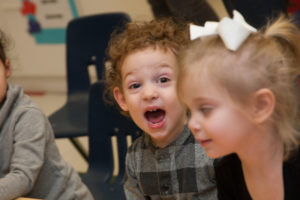The first day of preschool can be both an exciting and scary one for your child. While many children have an intrinsic desire to embark on this independent journey, those desires can shift when they find themselves engulfed by new surroundings. These new surroundings can cause separation anxiety for many children (…and their parents).
One of the most important things to remember as a parent is that separation anxiety is a normal fundamental within child development. Most children’s separation anxiety will begin to dwindle as they become used to a new environment; however, there are children who have it longer than others. Separation anxiety can come and go for children, depending on a multitude of factors. Some children can experience this before their first birthday while re-experiencing it throughout their toddler years. It can begin when you first leave your child alone in their crib, within their own bedroom. It can even last throughout one’s entire life. Just keep in mind that separation anxiety is a healthy internal function.
Being clingy, throwing tantrums, and extraneous crying are also symptoms of separation anxiety. One important symptom according to a PBS Kids article on Separation Anxiety (written by Katie Hurley, LCSW) is regressed behavior. This refers to forgotten skills that have been newly mastered such as being potty trained. Hurley says not to worry if your child suddenly doesn’t make it to the bathroom on time. This is 100% normal.
Rivkah is a veteran Early Childhood teacher and Director of the Rabbi Arthur Schneier Park East Day School EC Summer Program. Here are some of her tips on dealing with separation anxiety.
1. It is easier to separate from a nanny or the parent who is not the primary caregiver. After the first day, consider sending your child to school or camp with someone other than the mother.
2. Don’t “over talk ” separation. Discuss it with your child briefly the day before and the morning of. Explain that the child was going to play with toys, have a great time, and you would be back soon.
3. Be prepared to spend some time in class with your child. Some children need more time to acclimate than others. The time spent in the room with your child is an excellent investment in building trust that the situation is safe and that it is ok to be there with the teacher/counselor without the parent or caregiver.
4. Take the teacher’s cue as to when it is time to stay or leave.
5. Children do not have a sense of time. Initially, tell your child you are going for a cup of coffee or on an errand and that you will be right back.
6. Never sneak out. Tell your child you are leaving and will be back shortly.
7. Give your child a picture of family members to keep in his/her knapsack. It helps if a child is upset to look at these pictures.
8. Only speak positively about school or camp. Stress the special activities which you know your child loves like swimming, tennis, gymnastics….
9. Don’t compare your child to any other child. Some need more time to acclimate than others.
10. You and the teacher are a team. If there is a concern, discuss tomorrow’s strategies with the teacher to formulate a plan.
Remember: Your children will all separate, some at a faster rate than others but they all ultimately succeed!
The Rabbi Arthur Schneier Park East Day School is a prestigious Jewish Day School in the heart of New York City. Located in the Upper East Side, this Jewish Day School promotes academic growth through community and collaboration.
